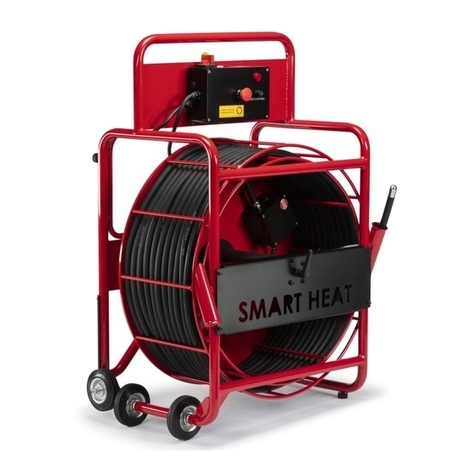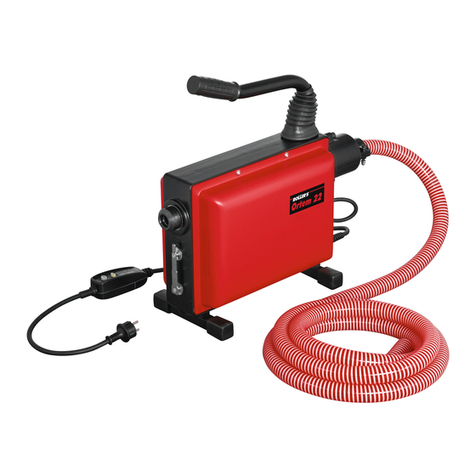Spartan 1065 User manual

SPSP
SPSP
SPARTART
ARTART
ARTANAN
ANAN
AN
© 2013 Spartan Tool LLC
Spartan Tool L.L.C.
800.435.3866
www.spartantool.com
Record the Serial Number of your
Model 1065
and give the number to the factory when
ordering parts.
Serial
Number_________________________
MODEL 1065
Owner’s Manual
44292000 (Rev. E) 4/03/13

Page 2
Warning
SPARTAN TOOL L.L.C.
1506 W. Division Street
Mendota, IL 61342
800 435 3866 Fax 888 876 2371
www.spartantool.com
— Read the safety and operating instructions before using any Spartan Tool products. Drain and
sewer cleaning can be dangerous if proper procedures are not followed and appropriate safety
gear is not utilized.
— Before starting unit, be sure to wear personal protective equipment such as safety goggles or
face shield and protective clothing such as gloves, coveralls or raincoat, rubber boots with metatarsal
guards, and hearing protection.
— Drains and sewer can carry bacteria and other infectious micro-organisms or materials which
can cause death or severe illness. Avoid exposing eyes, nose, mouth, ears, hands and cuts and
abrasions to waste water or other potentially infectious materials during drain and sewer cleaning
operations. To further help protect against exposure to infectious materials, wash hands, arms and
other areas of the body, as needed, with hot, soapy water and, if necessary, flush mucous membranes
with water. Also, disinfect potentially contaminated equipment by washing such surfaces with a hot
soapy wash using a strong detergent.
— For any questions contact the company at the address shown below.
“California Prop. 65: This product may contain an extremely small amount of lead in the coating.
Lead is a material known to the State of California to cause cancer or reproductive toxicity.”

Page 3
Table of Contents
OPERATING SECTION
Introduction ---------------------------------------- 4
Service Information ------------------------------ 4
Specifications and Features ------------------- 5
Safety Instructions ----------------------------- 6-9
Machine Features ------------------------------- 10
Assembly Instructions --------------------- 10-13
Operating ------------------------------------ 14-16
Operating the Power Cable Feed ----------- 16
Special Applications Procedure ------------- 17
Maintenance Instructions ----------------- 18-21
PARTS SECTION
Final Assembly------------------------------ 22-24
Drum Assembly ---------------------------------- 25
PM Motor Cover Assembly-------------------- 26
Frame Assembly --------------------------- 27-29
Distributor Arm Assembly --------------------- 30
Cable Guide Assembly ------------------------ 31
1065 PM Motor Assy --------------------------- 32
Motor Support Assy ------------------------ 33-34
Forward Reverse Switch ---------------------- 35
E-Z Lift Dolly -------------------------------------- 35
3/4” Cable----------------------------------------- 36
.66 Universal Anchor Assy. -------------------- 37
Air Foot Switch ---------------------------------- 37
.66 Magnum Cable ----------------------------- 38
Cable Safety Guide----------------------------61-62
Introduction --------------------------------------- 44
Attaching the Cable Safety Guide ----------- 45
Setting Your Cable Size ----------------------- 46
04221000 Universal Power Feed ---------- 47
04217500 Power Feed Assembly ----------- 48
04224000 Bearing Block Assy (Long) ----- 49
44219900 Bearing Block Assy (Short) ----- 50
44119600 Wheel Carrier Body (Long) ----- 51
44119700 Wheel Carrier Body (Short) ----- 51
Model 1065 & 2001 Installation ------------- 52
Model 200 and 300 Installation ------------- 53
Model 100 Installation ------------------------- 54
Operating Instructions ------------------------- 55
Cleaning Operation ----------------------------- 56
Disassemble & Reassemble Power Feed 56
Disassembly of Short Bearing Blocks ------ 57
Disassembly of Long Bearing Blocks ------ 58
Cleaning & Lubricating Instructions --------- 59
Re-Assembly of Short Bearing Blocks ----- 59
Re-Assembly of Long Bearing Blocks ------ 60
GENERAL INFORMATION SECTION
Warranty Information ---------------------------- 63
POWER CABLE FEED SECTION
Tool Box and Accessory Kit -------------- 38-39
Pneumatic Tire Upgrade Kit ------------------ 40
Hoist Bracket Upgrade Kit -------------------- 40
Spartan Accessory Blades -------------------- 41

Page 4
Introduction
The Spartan Model 1065 Electric Drain/Sewer Cleaning Machine has been designed and
manufactured with high quality materials and care in workmanship. The instructions in this manual
have been prepared to ensure that, when followed, the Spartan Model 1065 will provide long and
efficient service.
WARNING: It is the responsibility of the operator to read and understand the
Operator’s Manual and other information provided and use the correct
operating procedure. Machines should be operated only by qualified
operators. Failure to do so can result in personal injury, death or machine
damage.
Read the entire manual before the initial start-up of the machine. It is important to know the correct
operating procedures of the machine and all safety precautions to prevent the possibility of
property damage and/or personal injury.
NOTE: Information in this manual is current at the time of printing. Spartan Tool reserves the right
to make changes and improvements to its products at any time without notice or obligation.
Service Information
All requests for information, service or parts should include machine serial number. Additional
copies of this Owner’s Manual can be downloaded free of charge from the Spartan Tool website,
www.spartantool.com.
For more information contact: Customer Service, Spartan Tool L.L.C.
1506 W. Division Street
Mendota, IL 61342-2234
Phone (800) 435-3866
Fax (888) 876-2371
Record below and retain product model and serial number.
Model Number:____________________
Serial Number: ____________________

Page 5
Specifications and Features
IMPORTANT
For your own safety
Before assembling and operating this unit, read this operator’s manual carefully and
completely. Learn the operation, applications and potential hazards peculiar to this unit.
Drum Capacity: 110’ of 3/4” innercore of sewer cable, or 160’ of .66 Magnum cable.
Cleaning Up to 250’ (recommended line size: 3” - 10” diameter)
Capacity:
Motor: Permanent magnet; 120 volt AC (rectified); 0.65 amps (DC) @ 3050 rpm (no load);
4.2 amps (DC) 200 oz-in torque @ 1800 rpm.
Weight: 147 lbs. for a 1065 Power Feed machine w/10’ anchor cable.
Height: 40” to top of handle.
Width: 24”
Length: 33” with Dial-A-Cable Power Feed.
Drum Speed: 220 RPM with no load.
Cable Feed: Spartan Dial-A-Cable Power Cable Feed.
Frame: Extra strength aluminum magnesium alloy.
• Heavy duty permanent magnet motor with reverse capability.
• Inner drum rotates independently of outer drum, virtually eliminates cable kinking, buckling
and controls torque buildup.
• Outer drum keeps dirt inside, off operator and work area.
• Air foot switch with cord assembly keeps both hands free for safe, easy operation.
• Compact, portable design.
• Extra-strength aluminum magnesium alloy construction.
• Integral continuous belt stair skids.
• Retractable “Sure-Grip” handle.
• Permanently attached power cord connection to assure electrical safety at the machine.

Page 6
Safety Instructions
Figure 1
Use of any electrical equipment in a wet or damp environment can cause fatal shock if not properly
guarded against by the operator.
1. Know Your Drain Cleaning Machine. Read this Operator’s Manual carefully. Learn the operation,
applications and limitations of this machine.
2. Grounding Instructions. Before using your Spartan equipment, make sure that a properly grounded,
(three hole) electrical outlet is available. If not, as in older homes, use a three-prong adapter and
connect the green pigtail or grounding lug to a known ground, such as a (metallic) cold water
pipe.
This tool should be grounded while in use to protect the operator from electric shock. The tool is
equipped with a three-conductor cored and proper grounding type receptacle. The green (or
green and yellow) conductor in the cord is the grounding wire. Never connect this wire to a live
terminal. Units designed for use on less than 150 volts, have a plug that looks like that shown in
Fig. 1A. An adapter, (Fig. 1B and 1C), is available for connecting three-prong plugs to two-prong
receptacles, (except in Canada). If such an adapter is used, the green colored rigid ear, lug, or
the like, extending from the adapter must be connected to a permanent ground such as a properly
grounded outlet box.
This machine is equipped with a Ground Fault Circuit Interrupter (GFCI), which should always be
plugged directly into an inspected, grounded receptacle. Plug the three-pronged plug on the
machine power cored with GFCI directly into an inspected grounded outlet and then test and
reset the GFCI.
Never cut off the grounding prong on the power cord for use in a two-hole outlet. Doing so cuts off
your protection from shock. Replace or repair all damaged power cords and components.

Page 7
Safety Instructions (cont.)
3. Extension Cords. DANGER- Improper use of an extension cord will cause death or severe injury.
The GFCI on the machine’s power cord does not protect the operator from electrical shock along
the extension cord.
If an extension cord must be used, it must be of an approved, three-wire construction, equipped
with a three-pronged plug, and in good condition. Replace or repair damaged cords.
Do not use an undersized extension cord. An undersized cord will cause a drop in line voltage
resulting in loss of power and overheating. Use the following minimum gages depending upon
the length of the extension cord:
-16 Ga. –for cords of less than 100 feet in length
-14 Ga. –for cords of 100 feet to 150 feet in length.
If in doubt, use the next heavier gage. (The smaller the gage number, the heavier the cord.) When
the machine is used outdoors, use only extension cords intended for use outdoors and so marked.
Do not allow an extension cord to be exposed to water.
Don’t assume that all three hole outlets are properly installed. Check the outlet and also the adapter,
if used, with an outlet testing device which quickly indicates if a ground is connected. Correct a faulty
test indication before proceeding.
4. Don’t Abuse Cord. Never move or lift tool by cord or yank it to disconnect from receptacle. Keep
cord from heat, oil and sharp edges.
5. Disconnect Power Cord. When not in use, before servicing, and when changing accessories,
such as blades and cutters.
6. Guard Against Electric Shock. Prevent body contact with grounded surfaces such as pipes,
radiators, ranges, refrigerator enclosures.
7. Avoid Accidental Starting. Don’t move plugged-in tools. Make sure switch is in OFF position
before plugging in power cord.
8. Stay Alert. Watch what you are doing. Use common sense. Do not operate tool when you are
tired.
9. Keep Work Area Clean. Cluttered areas invite injuries.
10. Consider Work Area Environment. Don’t expose power tools to rain. Keep work area well lit.
Do not use tool in presence of flammable liquids or gases.
Avoid operating the machine in areas of standing water.

Page 8
Safety Instructions (cont.)
11. Dress properly. Do not wear loose clothing or jewelry. They can be caught in moving parts.
Wear protective hair covering to contain long hair.
Wear standard equipment. (Spartan riveted gloves). Never grasp a rotating cable with a cloth or
loose fitting glove which would get wrapped around cable. Replace gloves if rivets or staples
start to pull out.
Wear rubber boots and wear rubber gloves inside your Spartan cable handling gloves to further
insulate yourself.
12. Use Safety Glasses. Guard against foreign material that might fly off cable.
13. Don’t Overreach. Keep proper footing and balance at all times.
14. Keep Children Away. Do not let visitors contact tool or extension cord.
All visitors should be kept away from work area.
15. Use Recommended Equipment and Accessories.
Use of improper equipment may be hazardous.
Don’t force small cable with attachment to do the job of heavy-duty cable.
16. Don’t Force Tool.
It will do the job better and safer at the rate for which it was intended.
17. Remove Punches and Wrenches. Form a habit of checking to see that punches and adjusting
wrenches are removed from tool before turning it on.
18. Keep Guards in Place. Never operate machine with guard removed.
19. Avoid Operating Machine in Reverse. Operating machine in reverse can result in cable damage
and is used only to back tool away from an obstruction.
Warning! Continued drum rotation in reverse position will cause cable to “jump” out of drum. Possible
operator injury could result.
20. Do Not Over Torque Cables. Excessive and/or continued rotation of the drum once an obstruction
has been encountered will over torque the cable. Kinking or breakage of cable may result. A
worn cable can be identified as being very limber, kinked or as having flattened coils on the
outside of cable. Worn cable should be replaced as soon as possible.

Page 9
Safety Instructions (cont.)
21. Maintain Tools with Care. Keep tools sharp and clean for better and safer performance.
Follow instructions for lubricating and changing accessories.
Never use damaged power cords.
Inspect tool cords periodically and if damaged, repair with proper Spartan replacement parts.
Inspect extension cords periodically and replace if damaged.
Keep handles dry, clean, and free from oil and grease.
22. Check Damaged Parts. Before further use of the tool, a guard or other part that is damaged
should be carefully checked to determine that it will operate properly and perform its intended
function. Check for alignment of moving parts, binding of moving parts, breakage of parts,
mounting and any other conditions that may affect its operation. A guard or other part that is
damaged should be properly repaired or replaced.
Replace defective switches with proper Spartan replacement parts.
Do not use tool if switch does not turn on and off.
23. Store Idle Tools. When not in use, tools should be stored in a dry and locked up place, away from
children.
24. Handling Cables. Be very careful when cleaning drains exposed to cleaning compounds. Wear
protective gloves when handling cable, and avoid direct contact of skin and especially the eyes
and facial areas as serious burns can result from some drain cleaning compounds.

Page 10
Machine Features
1065 With Dial-A-Cable
Power Cable Feed
Figure 2
STUDY THESE INSTRUCTIONS CAREFULLY BEFORE YOU OPERATE YOUR EQUIPMENT
JOINING CABLES
All cables and leaders are coupled together by male and female couplings, and held securely by
means of expansion pins as illustrated.
The cable and coupling stand is furnished with the optional tool box to provide a support on which to
rest your cable when assembling or disassembling the couplings.
Assembly:
Place coupling in groove on top of stand with portion of expansion pin in upright position. Using
hammer, drive expansion pin down flush with coupling. Assembly is complete, cable and machine
are ready for use.
Assembly Instructions

Page 11
Figure 3
Assembly Instructions (cont.)
LOADING CABLE INTO MACHINE
Warning: Due to the amount of initial tension wound into your Spartan cable, care must be taken
when uncoiling the bundle of cable. The cable will spring apart after the wire ties, which secure
the cable, are cut.
After uncoiling the cable and laying out flat, attach the male end of the cable to the female end of the
10’ anchor in the drum. With the machine plugged in, depress the foot actuator and check the rotation
of the drum. The drum should rotate in a counter-clockwise direction, as you face the front of the
machine. If the drum rotates in the wrong direction, reverse the toggle switch located (Ref. to Figure
2) on the motor support and check rotation again. With the drum rotating in the proper direction, start
feeding the cable into the drum.
Caution: Always wear your riveted Spartan gloves when handling a rotating cable. Read the
section “How to Operate the Power Cable Feed” before you begin to feed cable into the drum.
Feed the cable into the drum with the drum rotating. This insures proper distribution of
cable inside the drum.
Leave about 2-3 feet of cable out of the machine to allow for attaching the next section of cable. After
loading your desired length of cable, attach either a two foot leader cable or a double male coupling.
You are now ready to attach your Spartan cutter blade assembly. (See Figures 4 & 5 for Cable
Connection Diagram).
Figure 4
3/4 Cable
Disassembling:
Position coupling stand at convenient distance from machine (2-3 feet.) Place coupling in groove,
expansion pin up, on top of stand. Place tip of punch (provided with machine) in expansion pin. Drive
expansion pin down with hammer. Note the shoulder on tip of punch, acts as a stop. Drive the punch
until shoulder is flush with the coupling. This is sufficient to permit the male and female portions of the
coupling to be separated but leaves the expansion pin, held securely in one half of the female coupling,
in ready position for reassembly.

Page 12
BLADES- The optional tool box is furnished with a number of different sizes and shapes of blades
for various size sewers and types of cleaning work. (Additional tools are listed on page 13)
Your Spartan blades can be attached to either a 2’ leader cable or a double male coupling. To attach
a cutter assembly the base of the blade holder assembly needs to be seated onto the hex part of the
leader or double male coupling. Next, the proper blade size is placed into the blade holder base.
After inserting the blade, secure with blade retainer, lock washer and nut. Draw up all blades
assemblies tightly with your T-wrench, otherwise vibrating may cause unnecessary loss of blades.
A T-wrench is furnished so you can quickly and conveniently assemble blades. With the blade assembly
attached, your now ready to operate your Spartan machine.
ASSEMBLY OF BLADES TO CABLE
WARNING: Always disconnect power cord before attaching or changing blades.
Each U-Type Cutting Assembly consists of:
Each Three-Blade Cutting Assembly consists of:
Figure 6
Figure 7
.66 Magnum Cable
Figure 5
Assembly Instructions (cont.)

Page 13
Part # Description Use
44006700 Extra Heavy Razor Sharp 2-1/2"
Round Cutter Blade
Used to cut roots and clear
blockages in 3", 4" and 6" lines.
High wear resistance.
44052600 Boring Tool Used in 3", 4" and 6" lines for
penetrating major blockages.
03416600 3" Grease Blade For cleaning grease or m uck lines.
Integral "paddles" act as a scoop
and cause a churning action within
the line for quicker, more efficient
cleaning.
03416700 4" Grease Blade For cleaning grease or m uck lines.
Integral "paddles" act as a scoop
and cause a churning action within
the line for quicker, more efficient
cleaning.
44063702 3/4" Tandem Cutter Assem bly
44063704 .66 Tandem Cutter Assem bly
Com bination tool used to penetrate
blockages and clean lines in one
operation. Penetrating blades and
cleaning blades are interchangeable
in a wide variety of sizes and types.
OPTIONAL ACCESSORIES
Tool box contains the following accessories:
•3-blade cutters in sizes 2”, 2-1/2”, 3”, 4”, 6”
•3-blade holder assembly
•cable uncoupling stand
•punch for expansion pin
•“T” wrench
•3” and 3-1/2” “P” trap blades with blade holder assembly
•4” saw blade
•spear blade
•2” and 2-1/2” blades with blade holder assembly
•3”, 4” and 6” blades with blade holder assembly
•retriever
•riveted gloves
•expansion pins, double male, male and female couplings,
splicer
•2’ flexible leader
OPTIONAL TOOLS
Assembly Instructions (cont.)

Page 14
WARNING: Never wear loose fitting clothing or jewelry when operating this machine. Always
wear your Spartan riveted gloves when handling cable.
1. Couple the leader or double male coupling, complete with the proper tool, onto working end of
the cable. See assembly instructions.
2. Use a small blade or spear blade on the end of your cable first. Most lateral lines are 4” to 6” in
diameter. It is advisable to use a 3” blade or spear blade first. That enables you to cut the core out
of the obstruction, to get the water running. Then remove the 3” blade, or spear blade. Put on a
blade the size of the sewer line to be cleaned, so you can actually scrape the line - thereby giving
a thorough, efficient cleaning job
A good rule of thumb is to use a tool at least 1” smaller than the line to be cleaned. The style of tool
is determined by the nature of job and is left to the discretion of the operator.
Flexible trap leaders should be used to negotiate p-traps and severe bends in line.
Double male couplings should be used when operating in heavy root build up or severe
obstructions.
3. Place your machine as close to the cleanout as possible. Do not allow more than 4 feet of
cable between the machine and the cleanout. Always use the Cable Safety Guide.
WARNING: Operator should be thoroughly familiar with the Safety Instructions Section
before attempting to operate this equipment.
4. Place foot switch, in a comfortable and accessible position in order to have power at all times.
5. Place the switch in the “F” (forward) position. Check by pressing down on footswitch making sure
that drum rotates in counter clockwise direction as you face the drum.
5a. Hand-feed the tool into the opening of the line and feed about 6” of cable in before turning
machine on.
Refer to the section “How to Operate the Power Cable Feed” before proceeding.
6. Exert sufficient downward pressure on the Cable Safety Guide to keep cable in line while
depressing foot actuator to start cable rotating.
6a. When using a Dial-A-Cable Power Cable Feed, keep one hand on the Cable Safety Guide
halfway between the cleanout and the power feed outlet. Keep your other hand on the power
feed control handle.
7. When your blade meets an obstruction, it will no doubt fail to rotate. A reduction in RPM will be
noticed. If RPM of the motor and drum decrease, quickly pull back on the cable to disengage
blade from the root or other obstructions. Thereby releasing torque or tension on your cable
- preventing buckling or kinking of cable.
Operating

Page 15
WARNING: Do not permit blade end to get hung up in an obstruction for more than 2 to 3 seconds.
Your job as an operator of this machine is to keep the cable rotating. Remember do not operate
the machine to the point where the cable begins to buckle. This practice is dangerous and could
damage the cable.
NOTE: Kinkage and breakage of cable is caused solely by one thing: you permit the working end
of the cable to get hung up in an obstruction and you keep on twisting the other end of same with
your motor, until something must give. Remember, the only way you can clean an obstruction from
a line, or negotiate a bend in a line, is when your blades are rotating. Let us repeat -your job is to
keep the blades rotating. The design of your motor is such that as soon as the blade end of your
cable gets hung up in an obstruction, your motor RPM reduces. That reduction in speed is notice
to the operator to pull the blade away from the obstruction, thereby releasing the tension that has
been built up in the coil-spring cable. That release of tension prevents buckling, kinking or breakage
of the cable.
8. A good rule to follow for releasing tension on a cable is this: when your blade gets hung up in the
obstruction and fails to rotate, an RPM reduction will be noticeable which indicates it is time to
pull the blade away from the obstruction. As you pull it away, all tension in the cable will be released
immediately and your blades will turn at a high speed. As soon as the blade is free, push it back
into the obstruction quickly so as to utilize the built-up power which enables you to clean the line
more quickly and efficiently.
WARNING: Do not allow a tool to get hung up in an obstruction. If a tool gets hung up in an
obstruction, a reverse feature is provided on this machine for just this purpose. In the event your
blade gets hung up on an obstruction and you are unable to release it in the normal manner, move
the toggle switch to the “OFF” position, and permit your machine to come to a dead stop. Then,
move the toggle switch in the “R” (reverse) position. Now start your machine slowly. See if you
can remove the blade from the root or other obstruction by this reverse action. When the blade is
released, let your machine come to a dead stop again. Then place the toggle switch in the “F”
(forward) position. Make sure that the cable/blade rotates counter clockwise, when standing in
front of the machine, except when reversing it to free cutting tool from obstruction.
WARNING: Do not reverse machine until motor and drum come to a dead stop.
Avoid operating this machine in reverse for any other purpose.
9. When you cut through one group of roots, it is always good to pull back your cable and take
another cut. This final cut is what gives you a thorough cleaning job.
Operating (cont.)

Page 16
10. When the job is complete, feed the cable back into drum, making sure that your machine is
running, so that the distributor arm can feed and distribute cable in the drum properly.
KEEP MACHINE RUNNING in the forward direction.
WARNING: Never retract tool from sewer inlet while cable is rotating.
NOTE: It is recommended that a continuous flush of water be used to clean cable and tool as they
are retrieved.
11. When tool is close to the clean out opening, release foot actuator and allow machine to come to
a complete stop.
12. Move toggle switch to the “OFF” position and disconnect machine from power source.
13. Pull remaining cable and tool from the line and hand-feed cable back into the drum.
1. The adjusting knob on the top controls the tension on the cable. It should be set so that the cable
feeds freely in-and-out of the drum. Tension can be increased by turning handle to the right. Don’t
apply too much tension - just enough to keep the cable moving is sufficient.
2. Cable is fed into the line by putting the handle in forward position. This speed will vary from 0-30
feet per minute depending on size of the cable and how far forward you push the handle.
3. Cable is brought out of the line by putting the handle in reverse position. You can also vary the
speed in reverse.
4. When the handle is straight up, the drive is in neutral position. There is no lateral movement of
cable at this point. This enables the operator to position the blade against the stoppage and
chew it away if necessary.
5. Another feature of the Dial-A-Cable Power Cable Feed is its ability to change from FORWARD
to REVERSE by simply moving the handle. The feed reacts immediately.
6. New drive design permits repair right in the field. Entire unit can be taken apart and put back in
working order in just ten minutes.
WARNING: (1) Never try to force the cable in to the line. Choose a proper feeding speed that
gives a smooth cutting action. (2) Refer to operating and maintenance instructions for proper
maintenance.
Operating the
Power Cable Feed
Operating (cont.)

Page 17
CLEANING LINES THROUGH A MANHOLE:
1. Position your machine at top and about 1’ away from manhole.
2. Use a length of 1-1/2” pipe with 45° elbow screwed there to (the depth of the manhole determines
the proper length of pipe to be used).
3. Hand-feed your cable, less leader and blade, through proper length of 1-1/2” pipe.
4. Fasten leader or double male coupling with proper size blade to end of cable.
5. Place blade into line by the use of extension pipe. The length of pipe referred to povides a guide
for your flexible shaft from the top of the manhole to the entrance of the line, thereby preventing
your cable from buckling or kinking. It likewise enables the operator to operate the machine in a
connivent, comfortable position at the top of the manhole. Never enter the manhole.
RODDING FARTHER THAN 100’ (3/4” CABLE*):
The reason the 10’ anchor cable is in the drum is this: When you have fed 100’ of cable into the line,
the female coupling on the end of the 10’ piece will show up at the end of the distributor arm on your
machine. You will then know that you have 100’ of cable in the line. Now, let’s suppose that the line
you are cleaning requires more than 100’ of cable.
This is the procedure to follow:
1. Disconnect the 100’ of cable and leave it in the line. Insure that it cannot fall into the pipe beyond
the opening.
2. Now, take the male end of your extension and add it to the 10’ piece in the drum, feeding the
whole extension piece into the drum. NOTE: The machine should be operating in the forward
direction.
3. Hook up to the 100’ piece in the sewer and resume rodding.
*NOTE: 150’ of .66 magnum cable can fit in the drum at one time.
MAIN SEWER OR SEPTIC TANK OVERRUN
It is very important to know the approximate distance from inlet to main sewer or septic tank.
Overrunning cable too far into main sewer or septic tank can allow cables to knot up and prevent
their retrieval.
Special Applications Procedure

Page 18
Splicing The .66 Magnum Cable and Installing New .66 Couplings
Item Description Part #
1 .66 Long Male Coupling 44120400
2 .66 Female Coupling 44120500
3 .66 Splicer 44053400
4 .66 Male Coupling 44120600
or .66 Leader Male Cou
p
lin
g
44120300
NOTE: Couplings and splicer for
the .66 Magnum Cable are not
interchangeable with 3/4” or 5/8”
Spartan cable connectors.
WARNING: Make sure machine is unplugged from the electrical system before making
any adjustment.
INSTRUCTIONS FOR SPLICING OR REPAIRING CABLE
Splicing Cable (Standard Single Wound Cable)
Step One: Square ends of cable to be spliced or repaired by placing each end against a grinding
wheel, grinding down so that the shoulder of splicer or coupling will butt squarely against the cable
ends. (If splicing “INNER-CORE CABLE”, and inner-core protrudes from cable at point of repair, pull
the inner-core out of the cable just far enough to allow for the insertion of the connector. Then cut the
inner-core off and push back into cable).
Step Two: Put cable in vice and open ends slightly with drive punch so that opening is just large
enough to allow connector to be inserted.
Step Three: Clean splicer or coupling of rust or grease.
Step Four: Connect cables to splicer, or coupling and draw uptightly to shoulder of connector, as
illustrated above.
Step Five: Put cable in vice and open ends slightly with drive punch so that opening is just large
enough to allow connector to be inserted.
Figure 8
Maintenance Instructions

Page 19
Step One: Grind cable square by placing the cable end against a grinding wheel. Care is to be
taken to assure the innercore is flush with outer cable. Grind outer cable and innercore down enough
to produce a flat contact surface between the cable and connector (splicer or coupling).
Step Two: Secure the cable into a vise, making sure innercore remains flush with outer cable.
Step Three: Clean connector and inside of cable from rust or dirt. (Care to be taken on cleaning
connector threads.) Also it may be necessary to deburr inside of cable.
Step Four: Insert connector into innercore in the manner of tightening a right hand threaded screw.
Tighten connector enough so that contact is made between outer cable and the connector face.
If required, step two through four should be repeated for the other cable end.
Step Five: Since the coupling and the wire in the cable are of high carbon steel, a special welding
process is required. Before welding, use a propane torch to preheat the area where the weld will be.
Hold the torch 4-5” away from the metal surface and heat for 2 minutes. Immediately, weld with an arc
welder, using 3/32” diameter unit rod #70 or equivalent chromium-stainless steel rod. Use a heat
range of 90-100 amps. Be sure weld bead is 1/8” wide and 1/2” long, where each wire end contacts
the coupling.
After welding, it will be necessary to stress relieve the welded area. Again, using a propane torch
holding 4-5” away from metal surface, heat up to approximately 5 minutes. Allow to cool and cable
will be ready for use.
NOTE: Never heat the cable to a cherry red color. This indicates too high a temperature and will
weaken the cable.
Figure 9 Figure 10
Maintenance
Instructions (cont.)

Page 20
Figure 11
Maintenance
Instructions (cont.)
LUBRICATING MACHINE:
All the lubrication required to keep your machine in working
order is to keep it greased the two zerk fittings that are
provided require greasing.
Figure 12
BRUSH CAP
CHANGING MOTOR BRUSHES:
WARNING: Make sure machine is unplugged from
electrical system.
1. Remove motor cover.
2. With the motor uncovered, unscrew brush cap. (See
figure 12).
3. Remove brush, mark the top of the brush. Note the
condition of brush end and brush length. If brush end is
chipped or damaged in any way, replace brush. Brush
length of 1/4” or less indicates time for replacement.
4. If brush is still good, replace into holder or; if not good,
replace with new brush. Repeat procedure on other side
then assemble cover and your machine is ready to run.
NOTE: If new brushes are used, run the machine for about
5 minutes before operating. Check brushes every 300
hours of operation and change motor brushes every 5 years.
CARING FOR CABLES:
NOTE: A new 10’ anchor cable should be replaced each time new cable is installed.
Spartan cables are of such design that no special care is required. At the end of each day of use,
cables and the inside of drum should be rinsed throughly with water to prevent damaging effects of
drain cleaning compounds, acids and other organic compounds that eat away the cable’s strength.
Cables should be replaced when they become severely corroded or worn. A “worn cable” can be
identified when outside coils of cable become flattened and/or the cable becomes limber. A light
weight rust inhibiting oil is recommended for use on cables when not in use. This serves to delay
the effects of acid but only for a limited time.
NOTE: Worn or corroded cable reduce the machine efficiency in removing obstructions. New
cable reduces chances of downtime and the time it takes to get the job done.
Other manuals for 1065
1
This manual suits for next models
1
Table of contents
Other Spartan Pipe Cleaner manuals
Popular Pipe Cleaner manuals by other brands
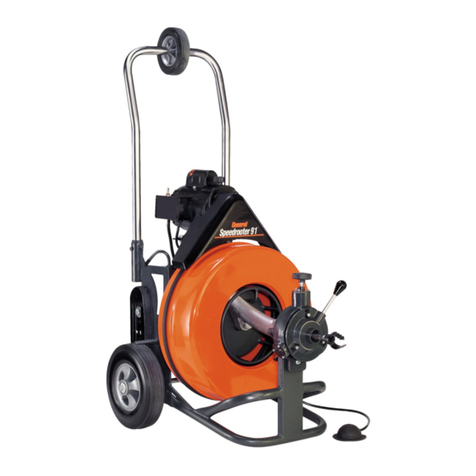
General Pipe Cleaners
General Pipe Cleaners speedrooter 91 operating instructions
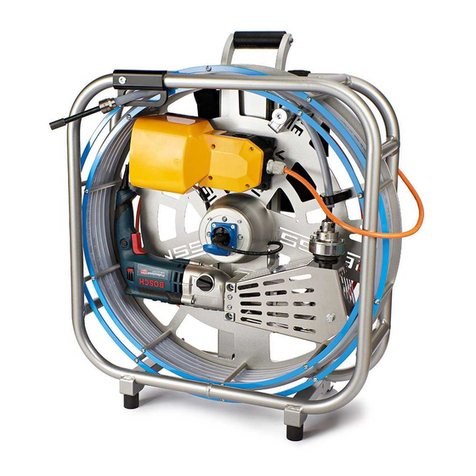
Renssi
Renssi RCM-10 instructions
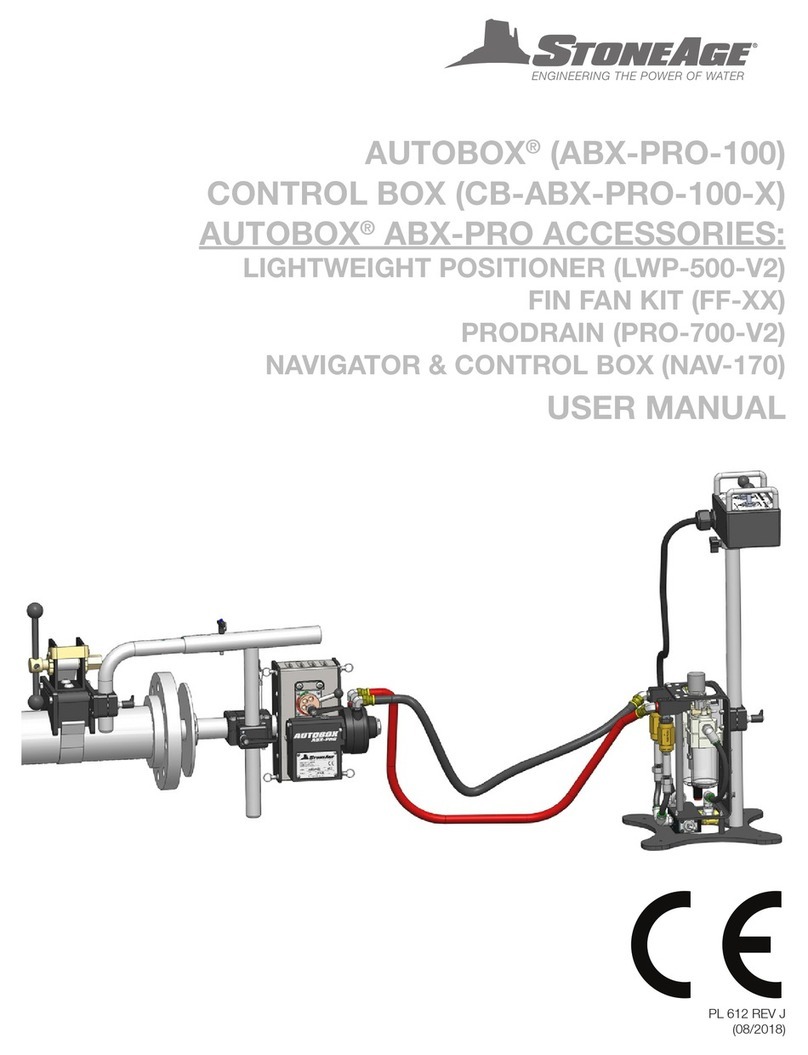
StoneAge
StoneAge AUTOBOX ABX-PRO-100 user manual
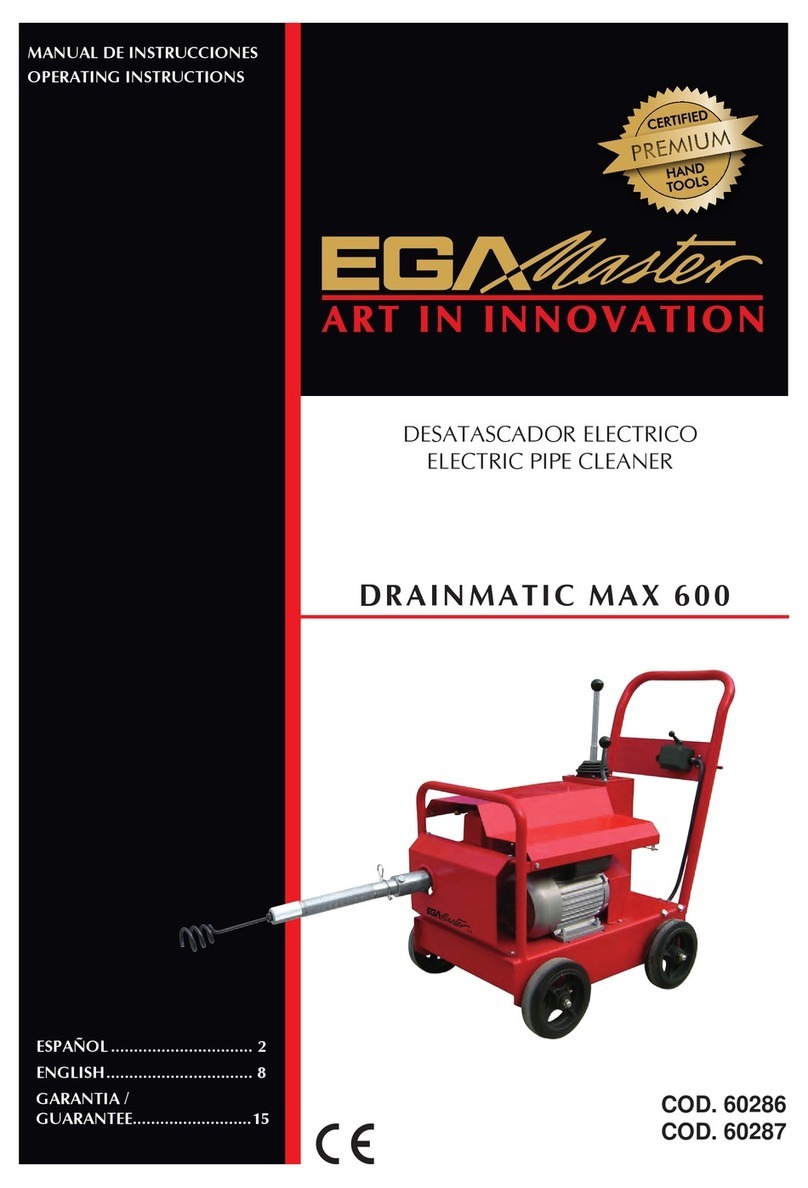
EGAmaster
EGAmaster DRAINMATIC MAX 600 operating instructions
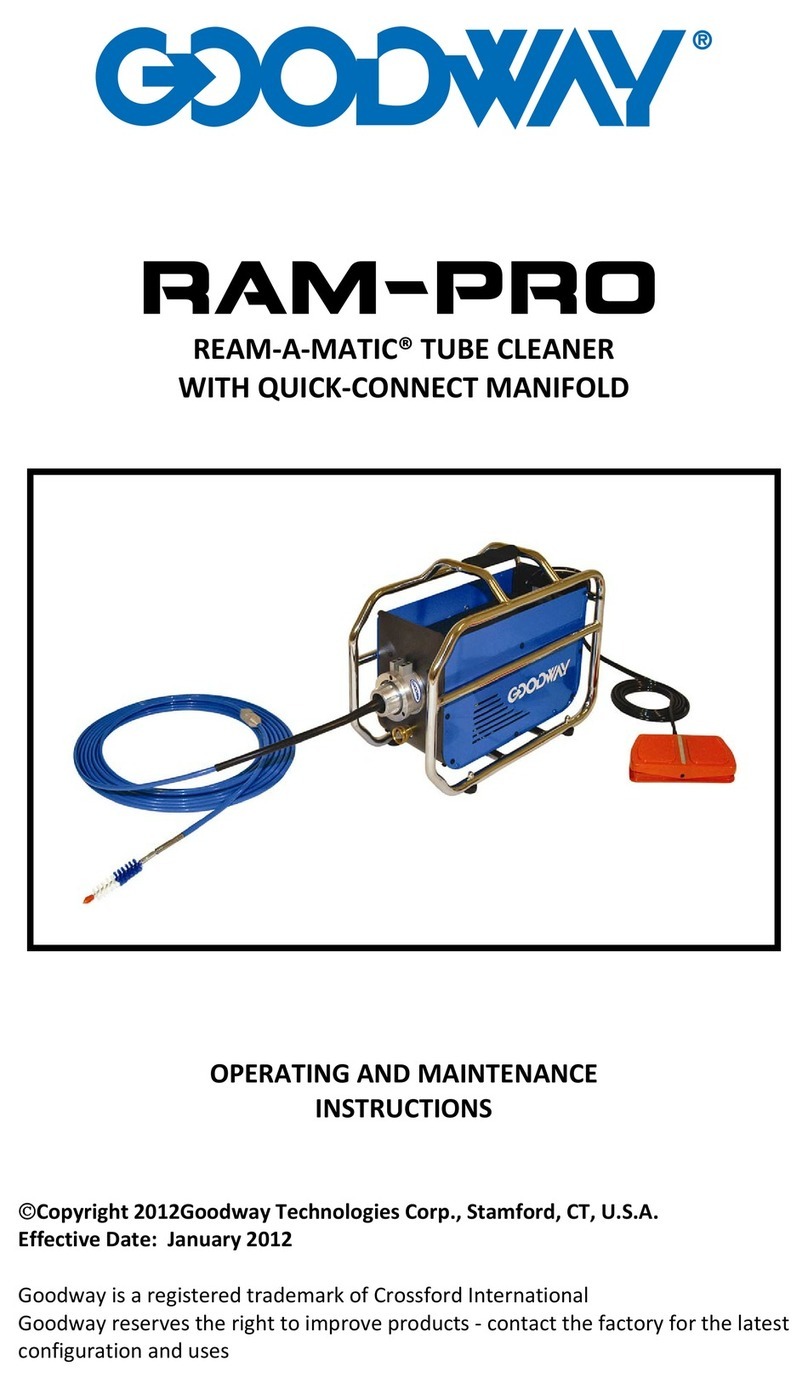
Good Way
Good Way REAM-A-MATIC RAM-PRO Operating and maintenance instructions

Virax
Virax VAL96QC user guide

